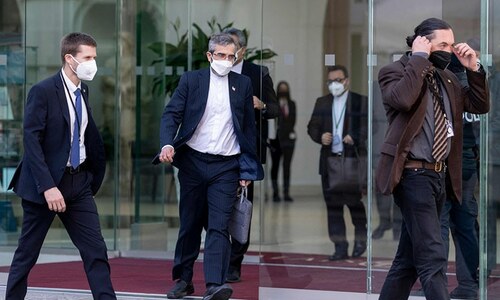TEHRAN: A leading European Union diplomat held talks in Tehran on Sunday, Iran’s state-run media reported, amid hopes that an agreement to restore Iran’s tattered nuclear deal with world powers could be completed.
The meetings between the EU’s envoy, Enrique Mora, and top Iranian officials come at a sensitive moment for talks to revive the deal, as the glimmers of a resolution to some of the thorniest issues in the negotiations have emerged.
The report on the talks in Tehran gave scant detail, saying only that the diplomats discussed the latest on the nuclear agreement, with Iran’s top nuclear negotiator Ali Bagheri Kani repeating that Iran believed a deal was within reach if America was realistic in its demands.
Blinken says US, Israel won’t allow Iran to acquire nuclear weapons
Nuclear talks broke off earlier this month as last-minute wrangles in Vienna coincided with Russia’s invasion of Ukraine and financial sanctions imposed by the West on Moscow.
In a visible sign that shared regional anxiety over a renewed nuclear deal was growing, the Israeli government hastily arranged an unprecedented summit of top diplomats from Arab countries that have normalised ties with Israel along with US Secretary of State Antony Blinken.
“We are both committed, both determined that Iran will never acquire a nuclear weapon,” Blinken said alongside Israel’s foreign minister, seeking to reassure his jittery counterparts before the gathering.
Speaking alongside his Israeli counterpart Yair Lapid, Blinken said the US believes restoring the agreement was “the best way to put Iran’s programme back in the box that it was in but has escaped” after the US withdrew from the deal under former president Donald Trump in 2018.
Remarks on Sunday by the US special envoy for Iran, Robert Malley, underscored the US limitations that have frustrated allies. He declined to discuss details of the nuclear negotiations, but reiterated that America had failed to secure a broader deal with Iran that would restrict its ballistic missiles programme and curb its regional military policies.
It would have been better, but (the nuclear deal) was not intended to, it wasn’t able to address the other issues, Malley told the Doha Forum, a Middle East policy conference in Qatar. Many in the region view the IRGC in the same way we do. ... But we know this is not a deal that’s going to address that.”
However, Malley was quick to stress that no matter what happens to the Guard’s terrorism designation, separate sanctions over its ballistic missile development and alleged human rights violations would remain.
Published in Dawn, March 28th, 2022














































Dear visitor, the comments section is undergoing an overhaul and will return soon.